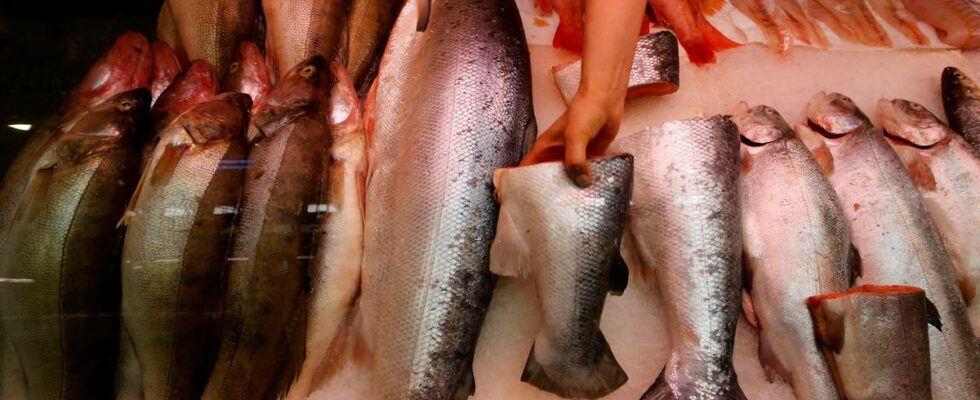When salmon has died of its own accord, has ended up on the floor or is sexually mature, it is considered unsuitable for ending up on the dinner plate. An internal investigation at the slaughter company Pure Norwegian Seafood showed that the company had sold salmon unfit for human consumption. The results of the investigation were completed in February, and the company announced that they would clean up the matter. Økokrim has now launched an investigation into Pure Norwegian Seafood. Investigating possible violations of the regulations – We are investigating whether fish that are not suitable for human consumption and production fish that have not been processed domestically before export, as required by the regulations, have been sold, writes police attorney Kristian Johansen in Økokrim in an email to news. The management of Pure Norwegian Seafood will not answer news’s questions about, among other things, the investigation. The new general manager, Remy Strømskag, writes in an e-mail: – After the publication, we have been careful to provide more information, out of consideration for the authorities’ further work on the matter. According to Økokrim, the case is in an initial phase. – For the sake of the investigation, we therefore do not wish to give any further comment at the current stage of the case, writes police attorney Johansen. Informed customers When the discrepancy was discovered, Pure Norwegian Seafood contacted customers. They informed that the salmon should not have been sold for human consumption, documents news has obtained through an inspection by the Norwegian Food Safety Authority show. A letter to a customer states: “It is possible that the salmon that was sold is potentially a food safety hazard” “It is possible that salmon that is not suitable for human consumption has been exported as Ordinary 2 from our slaughterhouse in Henda” What the buyers paid for the salmon are exempt from public disclosure. Salmon’s categories Superior fish of the best quality without flaws and blemishes, it is preferred in the export market. Ordinary Fish with limited external and internal defects. Production fish Cannot be exported until error correction. These are fish that have been dying or sick during slaughter, or have deformities or serious treatment errors. It can be used for human food, e.g. processed products. If the salmon has died of its own accord in the cage, it must not be used for human consumption. In principle, raw salmon should not be used for human consumption either, but there are exceptions. news has also gained insight into what the customers answered. In a letter to Pure Norwegian Seafood, it appears that the fish has already been sold to consumers. No one has reported any complaints from consumers. Photo: Letter to the Food Safety Authority Don’t know where the salmon ended up The Food Safety Authority was informed that Pure Norwegian Seafood had sold bad salmon. The inspectorate has unsuccessfully tried to find out where the salmon ended up. – It was difficult to track down the fish lots, since such a long time had passed from the time the fish was exported until we were notified. We expect that most of it has been consumed. Further follow-up depends on the outcome of the investigation. Here we await Økokrim’s conclusions, writes section head of the Norwegian Food Safety Authority, Lennart Floyd Berge. MATTILSYNET: Section chief Lennart Floyd Berge is waiting. Photo: Frederik Winness Ringnes / news Bad fish sent out of the country In addition to fish of poor quality, so-called production fish were also exported. It is low-quality fish, with wounds and injuries, which must be corrected before it can be exported. Estimates from the company show that 500 tonnes of fish unsuitable for food were sold and approximately 400 tonnes of production fish were exported. AVERØY: Quay at the butchery of Pure Norwegian Seafood. Photo: Marius André Jenssen Stenberg / news It is not known what income the company has had from selling salmon of poor quality. Pure Norwegian Seafood – Promoted as a supplier of high-quality salmon. – The company was established in 2010. As of today, the farming company Måsøval is the largest owner with 65 per cent. – In 2022, the company’s turnover is close to NOK 2 billion. The company has grown strongly over a few years. – Has a slaughterhouse at Averøy Several companies are being investigated In recent years, several discrepancies have come to light that concern the salmon being of too poor a quality. Several investigations into the salmon industry have been initiated in recent years. Last year, the Norwegian Food Safety Authority notified a total of 96 cases. Several cases concern animal welfare and the resale of salmon in violation of the regulations. It is unknown how many cases are actually being investigated. Published 11.09.2024, at 20.14
ttn-69
Investigating bad salmon that was sent abroad – news Norway – Overview of news from different parts of the country

